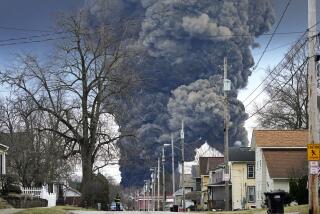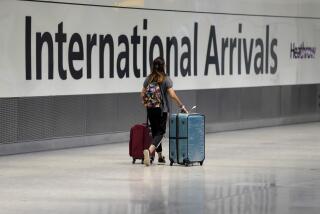Vacationing President Very Much on the Job : Crisis: Bush travels to Maine, as is his custom. Through instant and secure communications system, he is able to stay involved in Iraq situation.
KENNEBUNKPORT, Me. — Since sometime last spring, you could take it to the bank: Come August, with Congress gone and the nation’s capital in its summer doldrums, President Bush could be found back in Kennebunkport.
Congress left town, but the doldrums never came. Nevertheless, Bush left Washington on Friday for the sort of summer vacation he has enjoyed every year of his life save for one--1944, which he spent in the South Pacific during World War II.
The crisis provoked by Iraq’s invasion of Kuwait, aides said, could be dealt with from the rocky shores of Maine as well as from the depths of the situation room in the White House basement. And so, three days after ordering a massive U.S. troop deployment to the Middle East, and barely an hour after he arrived here, the President of the United States was out crashing through the ocean waves aboard his twin V-8, 28-foot cigarette boat Fidelity as a chilling fog settled over coastal Maine.
His line in the sand, declared to a national television audience Wednesday, wasn’t on any beach here.
“I’m determined that life goes on,” he said.
The President’s style was in marked contrast to that of Jimmy Carter, whose presidency was scarred by another Middle East crisis. For six months, Carter would barely move beyond the Rose Garden as he sought an end to the Iran hostage crisis, finally leaving town to cheer up the hospitalized survivors of the bloody but failed attempt to rescue the hostages.
“What you don’t want to do is appear to be held hostage in the White House to events. And I’m not going to do that,” the President said to reporters as Air Force One carried him northward to Maine.
“It seems,” said Stuart E. Eizenstat, Carter’s domestic policy adviser, “as if Bush has learned a lot of lessons from the Iran hostage situation. To the extent possible, it is important to keep about the regular business of the presidency, and that includes vacations, because to do otherwise makes the President as much a hostage” as those held captive in far-away lands.
“It’s important to let people know you’re on top of things, that you’re not on a boat for three months where no one can reach you,” said Eizenstat, for whom the lessons of the Iran hostage crisis remain fresh a decade later. “But you don’t want to create a crisis atmosphere. To the extent he presents an air of calmness, that everything is in place, it’s a plus.”
Calmness? Listen to the man: “Might go fishing. Or might tee it up. I’ll do something. I’m not going to sit idly by.”
For the peripatetic President, sitting idly by would itself be a crisis of sorts.
While some questioned whether it was possible for him to keep in touch with the situation in the Middle East from this northeast corner of the country 500 miles from Washington, or whether he was presenting the proper image to his fellow citizens at a time of national anxiety, there was no sign of wavering at the White House.
For the next 24 days in Kennebunkport, as in any city where the President alights, a miniature White House will function, with staff offices and secure communications facilities that receive and transmit cabled messages and reports, and allow the President access to the same sort of instant global communications network that he can use in the Oval Office.
“We have highly complex and highly efficient communications,” Bush said. “Haven’t you seen the telephone in my golf cart? Or boat? Word of honor.”
As if to prove the point, White House Press Secretary Marlin Fitzwater issued a statement saying that National Security Adviser Brent Scowcroft, in Washington, reached Bush aboard the speedboat, to discuss a statement of support issued in Cairo by the Arab League.
“The fact is that the President will be conducting the business of the presidency at Kennebunkport just as he does every year and every vacation period,” Fitzwater said.
Bush brought with him the complement of aides that normally travels on a vacation trip. Scowcroft stayed home in Washington, but his deputy, Robert M. Gates, made the trip here aboard Air Force One, as did the deputy chief of staff, Andrew H. Card Jr.
The President planned to meet here this weekend with Secretary of State James A. Baker III, who returned to Washington on Friday after a three-day journey to Turkey and Brussels for consultations on the Middle East crisis with Turkish President Turgut Ozal and NATO foreign ministers.
In addition, Bush plans to return to Washington next Wednesday, to meet with his national security team and receive a briefing on the status of the military forces from the Pentagon.
In short, it’s not the sort of vacation he envisioned barely a week ago.
“I’m going to be working,” he said.
More to Read
Sign up for Essential California
The most important California stories and recommendations in your inbox every morning.
You may occasionally receive promotional content from the Los Angeles Times.










